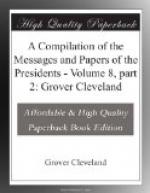In some of the large cities private express companies have undertaken to outstrip the Government mail carriers by affording for the prompt transmission of letters better facilities than have hitherto been at the command of the Post-Office.
It has always been the policy of the Government to discourage such enterprises, and in no better mode can that policy be maintained than in supplying the public with the most efficient mail service that, with due regard to its own best interests, can be furnished for its accommodation.
The Attorney-General renews the recommendation contained in his report of last year touching the fees of witnesses and jurors.
He favors radical changes in the fee bill, the adoption of a system by which attorneys and marshals of the United States shall be compensated solely by salaries, and the erection by the Government of a penitentiary for the confinement of offenders against its laws.
Of the varied governmental concerns in charge of the Interior Department the report of its Secretary presents an interesting summary. Among the topics deserving particular attention I refer you to his observations respecting our Indian affairs, the preemption and timber-culture acts, the failure of railroad companies to take title to lands granted by the Government, and the operations of the Pension Office, the Patent Office, the Census Bureau, and the Bureau of Education.
Allusion has been made already to the circumstance that, both as between the different Indian tribes and as between the Indians and the whites, the past year has been one of unbroken peace.
In this circumstance the President is glad to find justification for the policy of the Government in its dealing with the Indian question and confirmation of the views which were fully expressed in his first communication to the Forty-seventh Congress.
The Secretary urges anew the enactment of a statute for the punishment of crimes committed on the Indian reservations, and recommends the passage of the bill now pending in the House of Representatives for the purchase of a tract of 18,000 square miles from the Sioux Reservation. Both these measures are worthy of approval.
I concur with him also in advising the repeal of the preemption law, the enactment of statutes resolving the present legal complications touching lapsed grants to railroad companies, and the funding of the debt of the several Pacific railroads under such guaranty as shall effectually secure its ultimate payment.
The report of the Utah Commission will be read with interest.
It discloses the results of recent legislation looking to the prevention and punishment of polygamy in that Territory. I still believe that if that abominable practice can be suppressed by law it can only be by the most radical legislation consistent with the restraints of the Constitution.
I again recommend, therefore, that Congress assume absolute political control of the Territory of Utah and provide for the appointment of commissioners with such governmental powers as in its judgment may justly and wisely be put into their hands.




